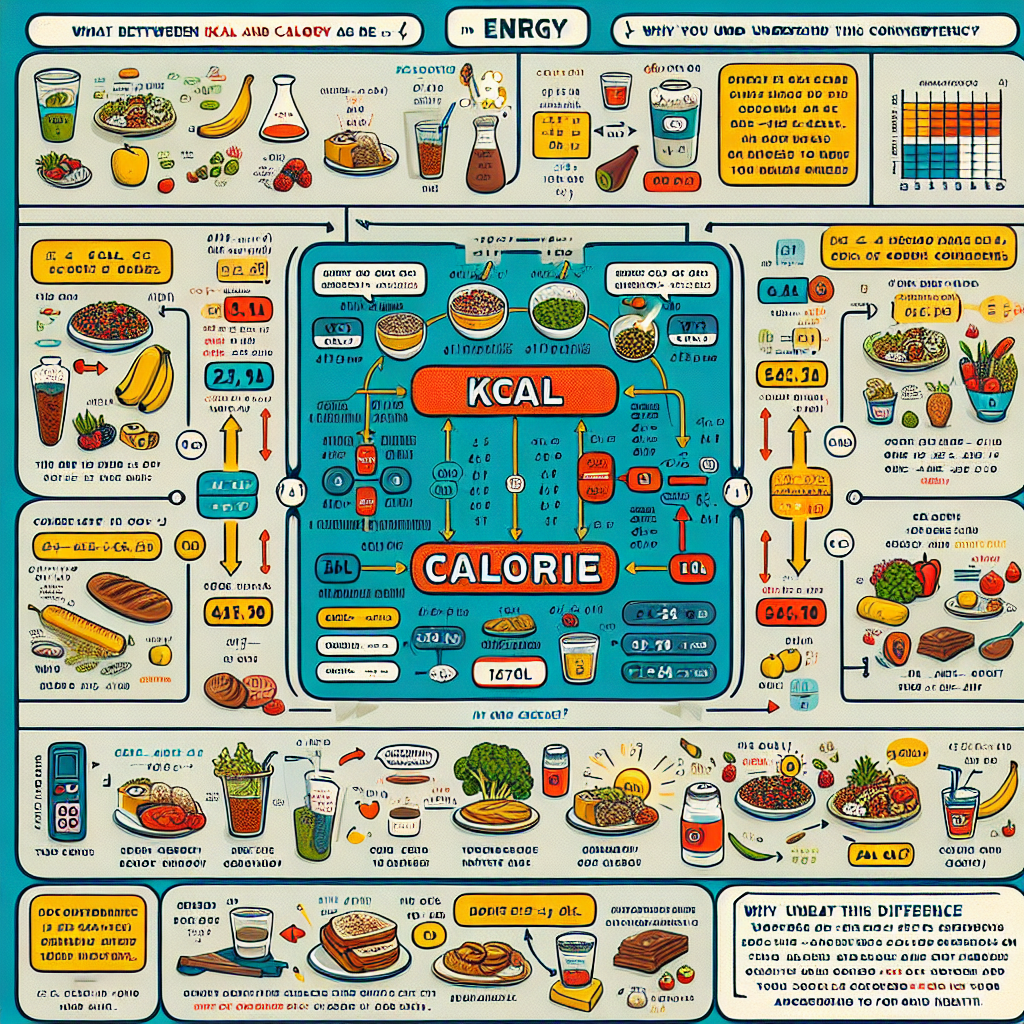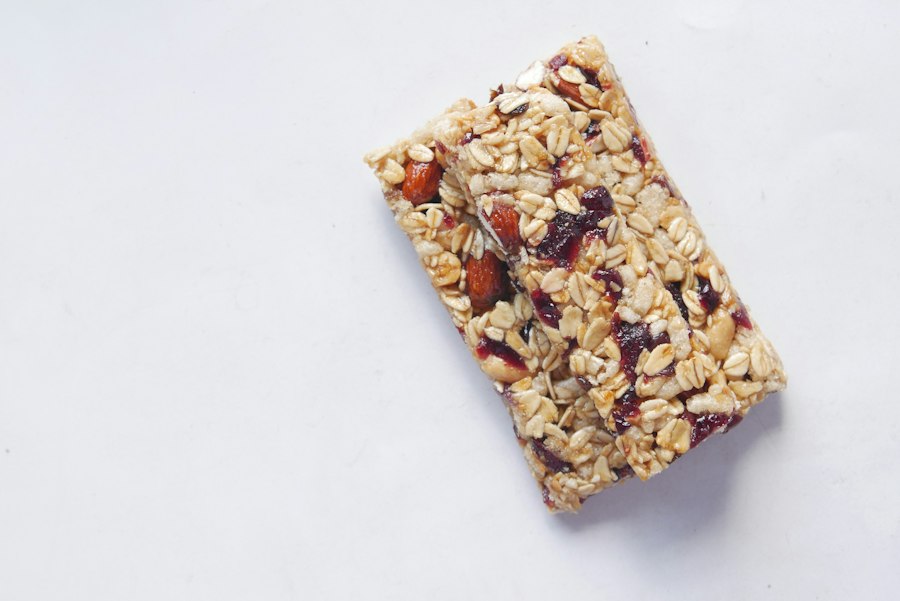Understanding the Difference Between kcal and Calorie: Why It Matters for Your Health

When it comes to nutrition, understanding energy measurement is crucial. The terms “kcal” and “Calorie” are often used interchangeably, but they actually refer to different units of measurement. The term “kcal” stands for kilocalorie, which is a unit of energy commonly used in nutrition. On the other hand, “Calorie” with a capital “C” is a common way of referring to kilocalories. So, 1 kcal is equal to 1 Calorie.
The importance of understanding energy measurement in nutrition cannot be overstated. Energy is a fundamental component of our diet and plays a vital role in our overall health and well-being. By understanding how energy is measured and the impact it has on our bodies, we can make informed food choices that support optimal health.
Key Takeaways
- kcal and Calorie are units of energy measurement used in nutrition.
- Energy measurement is based on the amount of heat produced by burning food.
- The conversion factor between kcal and Calorie is 1:1.
- kcal and Calorie play a crucial role in determining nutritional requirements and weight management.
- Accurate energy measurement is important for maintaining a healthy diet and lifestyle.
The Science Behind Energy Measurement
Energy is measured in units called calories. In the context of nutrition, a calorie refers to the amount of energy required to raise the temperature of one gram of water by one degree Celsius. This unit of measurement is used to quantify the amount of energy that food provides when it is metabolized by the body.
The role of energy in the body is multifaceted. It is required for basic bodily functions such as breathing, circulating blood, and maintaining body temperature. Additionally, energy is needed for physical activity and exercise. When we consume food, our bodies break down the macronutrients (carbohydrates, proteins, and fats) into smaller molecules that can be used as fuel. This fuel is then converted into energy through a series of chemical reactions in our cells.
Understanding the Conversion Factor
As mentioned earlier, 1 kcal is equal to 1 Calorie. This conversion factor allows us to easily convert between the two units of measurement. For example, if a food label states that a serving contains 100 Calories, it is equivalent to 100 kcal.
To convert between kcal and Calories, you simply need to multiply or divide by the conversion factor of 1. For example, to convert 500 kcal to Calories, you would divide by the conversion factor: 500 kcal ÷ 1 = 500 Calories. Similarly, to convert 200 Calories to kcal, you would multiply by the conversion factor: 200 Calories × 1 = 200 kcal.
The Role of kcal and Calorie in Nutrition
| Term | Definition | Importance |
|---|---|---|
| kcal | Kilocalorie, a unit of energy | Used to measure the energy content of food and the energy expenditure of physical activity |
| Calorie | A unit of energy, equivalent to 1,000 calories | Used interchangeably with kcal in nutrition and food labeling |
| Energy balance | The balance between energy intake (kcal consumed) and energy expenditure (kcal burned) | Important for maintaining a healthy weight and preventing chronic diseases |
| Basal metabolic rate (BMR) | The amount of energy (kcal) the body burns at rest to maintain basic functions | Used to calculate daily energy needs and inform weight management strategies |
| Daily energy needs | The amount of energy (kcal) an individual needs to consume each day to maintain energy balance | Varies based on age, sex, weight, height, and physical activity level |
| Macronutrients | Nutrients that provide energy in the form of kcal, including carbohydrates, proteins, and fats | Important for meeting daily energy needs and supporting overall health |
| Micronutrients | Nutrients that do not provide energy, but are essential for health, including vitamins and minerals | Important for supporting immune function, bone health, and other bodily processes |
Energy intake is a crucial aspect of overall health. Consuming an appropriate amount of calories is essential for maintaining a healthy weight, supporting bodily functions, and providing fuel for physical activity. However, it is important to note that energy needs vary from person to person based on factors such as age, sex, weight, height, and activity level.
Consuming too few calories can lead to malnutrition and a lack of energy for bodily functions. On the other hand, consuming too many calories can lead to weight gain and an increased risk of chronic diseases such as obesity, diabetes, and heart disease.
The Importance of Accurate Energy Measurement
Accurate energy measurement is essential for maintaining optimal health. Inaccurate energy measurement can lead to overeating or undereating, both of which can have negative consequences on our health.
When it comes to weight management, accurate energy measurement is particularly important. If we consume more calories than our bodies need, the excess energy is stored as fat, leading to weight gain. Conversely, if we consume fewer calories than our bodies need, we create an energy deficit that can result in weight loss.
To ensure accurate energy measurement, it is important to read food labels carefully and use reliable sources of information when tracking calorie intake. Additionally, using tools such as food scales and measuring cups can help ensure accurate portion sizes.
The Impact of kcal and Calorie on Weight Management

Energy intake plays a significant role in weight management. When we consume more calories than our bodies need, the excess energy is stored as fat, leading to weight gain. On the other hand, when we consume fewer calories than our bodies need, we create an energy deficit that can result in weight loss.
To effectively manage weight, it is important to strike a balance between energy intake and energy expenditure. This can be achieved through a combination of healthy eating habits and regular physical activity. By consuming an appropriate amount of calories and engaging in regular exercise, we can maintain a healthy weight and support overall health.
The Relationship Between kcal and Calorie and Exercise
Energy intake also plays a crucial role in exercise performance. When we engage in physical activity, our bodies require additional energy to fuel the muscles and sustain performance. Consuming an appropriate amount of calories before and after exercise can help optimize energy levels and enhance performance.
The type and intensity of exercise also impact energy requirements. Endurance activities such as running or cycling require more energy compared to low-intensity activities like walking or yoga. It is important to adjust calorie intake accordingly to meet the increased energy demands of exercise.
Common Misconceptions About kcal and Calorie
There are several common misconceptions about energy measurement that can lead to confusion and misinformation. One common misconception is that all calories are created equal. While calories provide the same amount of energy, the source of those calories (carbohydrates, proteins, or fats) can have different effects on the body.
Another misconception is that consuming fewer calories automatically leads to weight loss. While creating an energy deficit is necessary for weight loss, it is important to do so in a healthy and sustainable way. Severely restricting calorie intake can lead to nutrient deficiencies and metabolic adaptations that hinder weight loss efforts.
To avoid these misconceptions, it is important to seek information from reliable sources such as registered dietitians or reputable scientific studies. Additionally, focusing on the quality of calories consumed rather than just the quantity can help support overall health and weight management.
How to Calculate Energy Requirements
Calculating energy requirements can be a helpful tool for understanding individual calorie needs. There are several formulas that can be used to estimate energy requirements, such as the Harris-Benedict equation or the Mifflin-St Jeor equation. These formulas take into account factors such as age, sex, weight, height, and activity level to provide an estimate of daily calorie needs.
It is important to note that these formulas provide an estimate and individual needs may vary. Additionally, it is important to listen to your body’s hunger and fullness cues and adjust calorie intake accordingly.
Making Informed Food Choices for Optimal Health
Understanding kcal and Calorie is essential for making informed food choices that support optimal health. By understanding energy measurement and its impact on our bodies, we can make choices that align with our individual calorie needs and support overall well-being.
Whether it’s managing weight, fueling exercise performance, or maintaining overall health, energy intake plays a crucial role in our lives. By being mindful of our calorie intake and making choices that prioritize nutrient-dense foods, we can support our bodies in functioning at their best. So next time you see kcal or Calorie on a food label, remember that it’s not just a number – it’s a measurement of the energy that fuels our bodies.
If you’re interested in learning more about the relationship between kcal and calorie, you might find this article on “Nutrition Fundamentals for a Healthier You” helpful. It provides a comprehensive guide to understanding the basics of nutrition and how it impacts our overall health and wellbeing. From debunking common myths to explaining the importance of macronutrients and micronutrients, this article covers it all. Check it out here.
FAQs
What is kcal?
kcal stands for kilocalorie, which is a unit of energy commonly used in nutrition to measure the amount of energy in food.
What is a calorie?
A calorie is a unit of energy that is commonly used to measure the amount of energy in food. It is defined as the amount of energy required to raise the temperature of one gram of water by one degree Celsius.
What is the difference between kcal and calorie?
The terms kcal and calorie are often used interchangeably, but technically, a kcal is equal to 1000 calories. So, when you see a food label that says “100 calories,” it actually means 100 kcal.
How do I convert kcal to calorie?
To convert kcal to calorie, simply multiply the number of kcal by 1000. For example, if a food contains 200 kcal, it contains 200,000 calories.
Why do we use kcal instead of calorie?
Kcal is often used instead of calorie because it allows for easier measurement of the energy content of foods. Since many foods contain a large number of calories, using kcal makes it easier to express the energy content in a more manageable number.